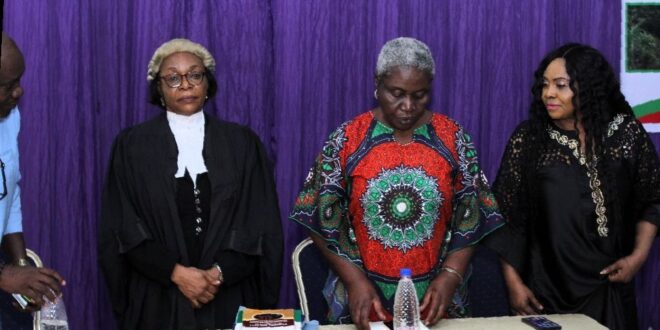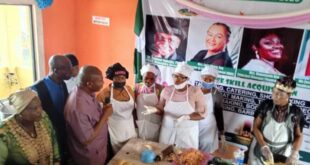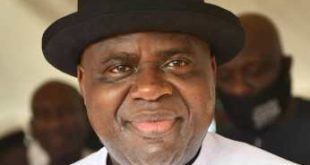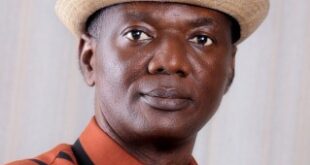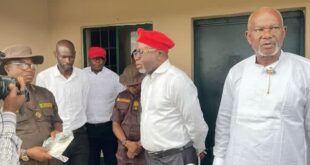… as 80 Women test Positive to Benzene in Otuabagi Community
By Kelechi Nwaucha
Women from communities in the Niger Delta have dragged international oil companies, Shell Petroleum Development Company (SPDC), Total E&P and Agip Oil Company, before an Environmental Tribunal, sitting in Port Harcourt on Wednesday, August 7, 2024, accusing the multinationals of gross environmental degradation and destruction of their ecosystem.
This was as report indicate “serious cases of benzene accumulation” among women living in Otuabagi, the first oil-bearing community in Nigeria, with 80 of those sampled testing positive to the existence of the carcinogen in their blood.
The tribunal also comes against the backdrop of persistent calls by the women, from various rural and oil-bearing communities, for the IOCs to remediate their lands before the final divestment of their onshore holding in the country.
Laying their complaints before a ‘Mock Environmental Tribunal,’ organised by Kebetkache Women Development and Resource Centre, with support from WoMin African Alliance, Niger Delta women from Okwuzi, Eleme, Rumuekpe (in Rivers State) and Otuabagi (in Ogbia, Bayelsa State) presented a long list of woes that included benzene accumulation, air pollution, soil poisoning, deprivation of livelihood sources, among others.
In the case brought before the tribunal against Shell Petroleum Development Company, by Otuabagi Women’s Initiative, Mitema Suoye George who lamented the impact of oil exploration on the health of women in her community, said “I’m a widow, suffering in the community, with my children.”
Oil was first found in commercial quantity in Nigeria in 1956 in Otuabagi community (though popularly referred to then as Oloibiri). 58 years down the line, with the oil wells in the community having been declared ‘dry’, Otuabagi women, according to a research conducted by Kebetkache Women Development and Research Centre, are paying the price with their health.
Mitema Suoye George told the tribunal in Port Harcourt on Wednesday that “My grandmother, my mother suffered for it. I come to grow up to see that women in my community are not growing old like other communities. So when my grandmother died, I said, why is this thing happening like this now? Are we going to die like that at that age too?
“We thought that maybe it’s a generational curses. not knowing that those problems are in our bodies. Not knowing that it’s the ground (oil) that is affecting us,” she said.
The report, commissioned by Kebetkache, but carried out by experts, among other health issues, discovered that 80 women in the community tested positive for benzene in their samples.
“One of my women said that, everything we eat contains crude oil, and if you cut my waist now blood will not come out but it’s crude oil that will come out. We took it as joke.
“Now, Otuabagi women are in pains. The day that they (Kebetkache) unveil this report, all of us were scared. My women are in danger. Most of them now, they are not seeing their menstruation again. At the age of 35 years now, they are not menstruating again.
“You will see women, children with rashes everywhere. Now, even for women, breathing is a problem, they have difficulties in breathing,” Mitema Suoye George said.
Martha Egbe, an indigene of Eleme Local Government Area in Rivers State, told the tribunal that her community is surrounded by water, with oil and gas pipelines also crisscrossing the area. She alleged that “Shell could not manage their product. So, their pipes started leaking and polluted all our waters.
“The water that we used to drink, we used to fetch in the farm, during work. But because of this damage from Shell, we cannot lay hands on our good water again.”
She said as a result of the pollution, the community has lost access to the salt water “our parents used to fetch it and cook,” periwinkle and aquatic food and resources, as well as cultural practices that have direct relationship with the river.
“The river is where our first (daughters) normally go and do their traditional marriage rites. They go there to fetch water and give to their husband to drink. Imagine that that river is being polluted, yet our women have to go there to fetch the water,” she said.
According to Egbe, environmentalist and MOSOP president, Andy Wai-Ogosu, after conducting tests on the Okulu River, said that there is up to three feet of oil on the river.
“Shell has caused so much damage on us. We cannot see food to eat. Mothers are dying. Children are dying. And because of the pollution that is on the land, in the air and the water beneath, under the earth, our people, when they sleep in the night, they will die and remain in the bed, and no one will know for days.”
Blessing Orijos, secretary of Women’s Prayer Warriors in Rumuekpe community, in Emohua Local Government Area of Rivers State, presented the case of an oil spill that occurred in 2013, accusing Shell, Total E&P and NDPR (Niger Delta Petroleum Resources), of neglecting to remediate the impacted soil, water body and environment till date.
She said, “You cannot go to that place and see a living thing moving inside the water or the land. That water has been a source of water where we get our drinking water and fish, crayfish.
“Even the land, the bush, you can’t even see a single tree in that land. Not even mushroom. Talk of animals in that place. They can’t even farm on that land. When you go there to plant, once you dig the soil, you dig out oil.
“Many use the water to bathe. Many use the water to wash their hands, their faces and that has given us eye problems, which are one of them. Some people have rashes, like wounds. Some people have cancer, miscarriage, heart attack, even everlasting wounds,” she said.
Peace Mgbenwa, from Okwuzi Community in Egba/Egbema/Ndoni Local Government Area of Rivers State drew the tribunal’s attention to the “choking” air pollution from the continuous gas flare, which has been on since 1967, at the Agip location in the community.
Mgbenwa said a skin rash, “that has defied medication,” has enveloped the community, making life a misery for women and children in Okwuzi.
“Like the land, our water is polluted. The problem now is that everybody is having rashes, both men, women, children,” she said, adding that though “it started long ago, but this year it becomes worse.”
Executive Director of Kebetkache, Dr Emem Okon, whose organisation commissioned the report on Otuabagi women, said the Environmental Tribunal “is one of the activities Kebetkache holds to amplify the voices of community members, particularly women, on the environmental challenges that they experience in their communities.
“It is a platform created so that communities and women can bring up issues of human rights abuses as regards the environment and also where Kebetkache can pick case studies to build advocacy and campaigns around,” she said.
Dr Okon said her organization hosted the first Environmental Tribunal on June 22, 2002, in Uyo (Akwa Ibom State), which was also on the eve of the first Niger Delta Alternative Convergence
“In that forum we had about eight to ten cases that were presented by communities we had a case presented from Obele community, Iba community, Erema, Eastern Obulu in Akwa Ibom, Ibeno and several other communities.”
She said that the motivation behind the project, “is to encourage communities so that they don’t keep quiet. There are critical cases that communities should actually ask for compensation or for damages but because they don’t know how to go about it they keep suffering in silence.
“So it’s a platform created so that people will feel safe and confident to come and make a report, so that Kebetkache and other CSOs can decide to take up those cases and try to follow up with it carry out advocacy and see how these people can be helped to seek the redress either from the government or from the corporations that are directly responsible for such abuse of environmental rights.”
Noting cases of pollution in various communities in the Niger Delta, Dr Okon said Wednesday’s tribunal was particularly focused on women.
“We know that women have been marginalized. Many of them are not part of the decision-making process. So even the community governance processes don’t really encourage women to come out and report issues of environmental pollution.
“Kebetkache conducted a research in 2022 on the effects of oil extraction in the Otuabagi community, the host of Oloibiri Oilwell 1 and Oilwell 2, and the findings are critical. There are impacts on health. In fact, the explosive one is that 80 women whose blood samples were taken have hydrocarbon in their blood. We cannot keep quiet. Nobody should keep quiet. Something should be done for those women,” she said.
Rosemary Inko-Dokubo Esq, legal practitioner and managing solicitor of Rose & Associates, who presided over the 5-member tribunal, held that “The women have genuine cases.”
She however adjourned two of the cases, so as to allow the communities the opportunity to strengthen their presentation of evidence, in line with the Evidence Act, while declaring that the Otuabagi women deserve to be compensated.
“These four communities came to the court, and out of those four communities, one or two were adjourned. We didn’t want to be harsh on them ordinarily. We have taken our evidence. What is left now is for judgment,” she said.
Asked if the mock tribunal will culminate in a real court trial, Inko-Dokubo said “Yes, eventually. Yes, of course. We are gathering our papers. Fortunately, they (the communities) now know their loopholes. So they will go and work on those loopholes and present properly.
“You see, in the law, sentiments are placed apart. They don’t look at your face. They don’t look at what you have suffered. What they want to see is facts. And how you present your facts is by evidence,” she said.
Idongesit Smart, Program Officer at Kebetkache, said “We decided to conduct the test in Otuabagi because when we visited the community, one of the women jokingly said if you cut my waist now, there will be no blood. What will come out is crude oil.
“So it motivated us to say, okay, let’s conduct this research. We contracted the professionals to do the research. And the result came out, it surprised everybody. What the woman said two years ago, jokingly, was really not far from truth.”
Smart said though seven communities came to the tribunal last Wednesday, only four communities that presented their case. Abua, Erema and another could not, she said.
 PH Mundial – Port Harcourt Online Newspaper News Across The Region
PH Mundial – Port Harcourt Online Newspaper News Across The Region

